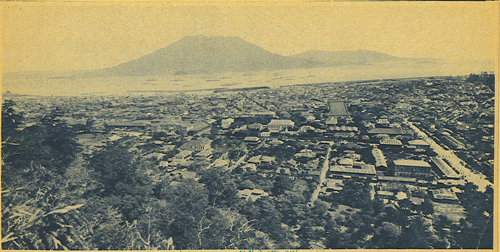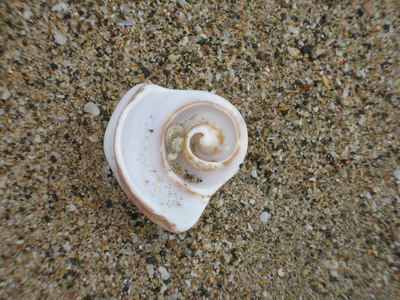Ashes to Ashes
In Japanese, "gray" is literally the color of ash:
灰色 (はいいろ: gray; ashen) ash + color
Clever! I never would have thought of representing "gray" that way, but I actually can't think of a better combination!
Incidentally, the Japanese originally represented "gray hair" not with 灰 or 灰色 but with 白. In terms of both hair and the color of the sky, 白 can convey either "white" or "gray." Japanese words for hair that's no longer dark originally incorporated 白, as in this term:
斑白 (はんぱく: grayish color; grizzled hair) spots + white
However, English has influenced Japanese to the extent that グレー (gray) and シルバー (silver) now pop up as descriptions of older people's hair. For instance, seats reserved for elderly or disabled passengers used to be called シルバー・シート ("silver seats").
Furthermore, people sometimes refer to gray hair as ロマンス・グレー, which is literally "romance gray"! This term can mean not only "gray hair" but also "attractive older man with some gray hair." Women's gray hair apparently doesn't inspire romance!
With that clarified, let's return to 灰.
Anne Hill, who helps me out in countless ways, told me a story that makes me marvel at her Japanese listening comprehension. She said that when she took a ferry to Kagoshima (on the southwestern tip of Kyushu), she heard an unusual announcement:
降灰が降っています。ご注意ください。
It is ashing. Please be careful.
降灰 (こうかい: volcanic ash); 降る (ふる: to fall); 注意 (ちゅうい: caution)
Because she had recently learned 灰 and 降, she recognized them in 降灰. Impressive!
Anne says that「降灰が降っています」 must be a phrase unique to Kagoshima, where the volcano Sakurajima frequently dumps large quantities of fine ash on the city: "That day we all got off the boat, umbrellas at the ready, and I remember seeing a helmet hanging from the handlebars of a scooter on the quay, full to the brim with ash."

Photo Source: NYPL Picture Collection
This photo from 1914 shows Kagoshima buried in ash after Sakurajima (in the background) erupted. Wikipedia calls this the most powerful volcanic eruption in 20th-century Japan. To the right of Sakurajima lies a small island, rumored to be the top of the volcano that blew off in an eruption long ago. Whether or not that bit is true, Sakurajima has definitely altered the landscape. After the 1914 eruption, lava flowed for months, filling in the strait between Sakurajima and the mainland and thereby changing Sakurajima from an island into a peninsula!
Wikipedia says that the 1914 eruption started out being "explosive" (generating eruption columns and pyroclastic flows) and then became "effusive" (generating large lava flows). I didn't realize that a volcano could be effusive! I much prefer effusive people to explosive ones, but I'm not sure which type of volcanic activity I like better.
Let's return to the photo (sorry, I don't seem to be able to stay on track today!) and examine the Japanese caption that accompanies it on Wikipedia:
桜島の大正大噴火で火山灰に覆われた鹿児島市街
桜島 (さくらじま: name of a volcanic island, literally "cherry blossom island"); 大正 (たいしょう: name of a Japanese era, 1912–1926); 大噴火 (だいふんか: major volcanic eruption); 火山灰 (かざんばい: volcanic ash); 覆う (おおう: to cover, shown here in the past tense of its passive voice); 鹿児島 (かごしま: place name); 市街 (しがい: urban areas; the streets; city)
It's great to see our star kanji front and center in that sentence!
Strangely, I seem to keep running into 灰. I'm currently working on the 殻 essay, and although 殻 primarily means "shell," it can also refer to the remnants of a process, in which case it can mean "cinder" and "ash." Breen includes this word:
灰殻 (はいがら: ashes)
I rejoiced that the yomi lent itself perfectly to a rhyme about 灰殻 (はいがら) in the 灰皿 (はいざら: ashtray). But my proofreader doused my effusiveness by informing me that 灰殻 must be an uncommon word, as none of his sources includes it. Drat!
Just as 殻 mainly means "shell," so does 貝. This kanji combines with 灰 in a word that definitely exists in Japanese dictionaries. A Quick Quiz! What do you think the following word could mean?
灰貝 (はいがい) ash + shell
a. ashes in the shape of a shell
b. snail; spiral shell
c. remnants of a bonfire on the beach
d. marine layer of fog
I'll block the answer with a preview of today's new publication, essay 1715 on 販 (marketing, selling):

Okay, now for the answer:
b. 灰貝 (はいがい: ash + shell) means "snail; spiral shell." In the past, people burned snail shells to make 貝灰 (かいばい: shell lime), which they used for plaster. Some sources say that this inverted word gave rise to 灰貝.

Photo Credit: Eve Kushner
The shell is from Costa Rica. Five years ago, I developed a brief obsession with photographing beautiful shells on the beach, having no idea where my effusiveness would lead. But as we've seen, effusiveness can change the landscape!
Have a wonderful and effusive weekend!

Add comment